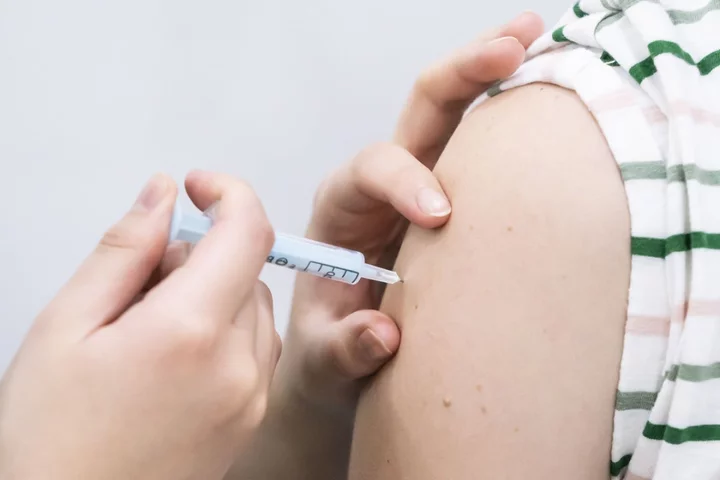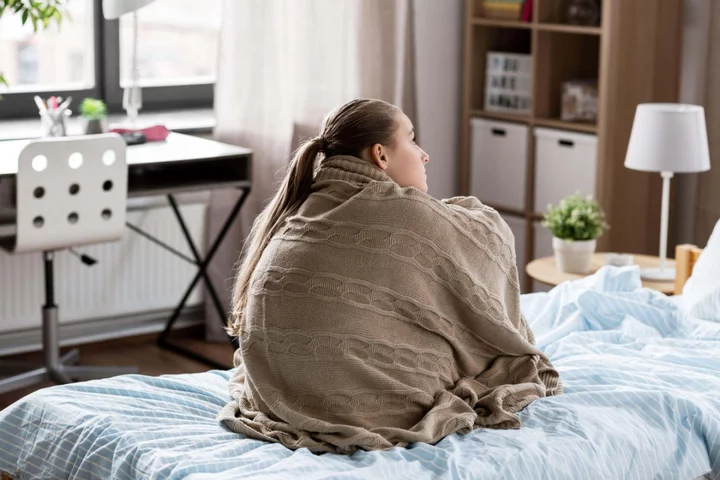
David Hunter: Appeal against Cyprus manslaughter verdict begins
David Hunter was convicted of the manslaughter of his ill wife but could be tried again for murder.
2023-10-26 16:49

Shingles symptoms, what causes it and how to treat the virus
Shingles can be a very painful experience that affects around one in four adults in their lifetime. The infection, also known as herpes zoster, is caused by the varicella-zoster virus which also causes chickenpox. The virus is extremely common, with more than 90 per cent of the world’s population having it. It is usually contracted when people get chickenpox as children, but the virus does not go away, instead, it will lay dormant in the body’s nervous system for years. For about a third of people who get the virus, it will reactivate some years later and cause shingles. Here is everything you need to know about the symptoms of shingles and how to treat it: What are the symptoms? A person who gets shingles will experience a painful rash that can occur anywhere on the body. Early signs of shingles could be a tingling or painful feeling in an area of skin, a headache or feeling generally unwell. According to the NHS, the rash usually looks like “a single stripe of blisters that wraps around the left side or right side of your torso”. They appear as blotches on the skin that become itchy blisters, which can break and ooze fluid. The rash can be red, but this can be harder to see on brown or black skin. The rash can also appear on your face, eyes and genitals. If it appears around your eyes, it can affect your sight or hearing and make it hard to move one side of your face. According to the Mayo Clinic, if left untreated, the infection can lead to permanent eye damage. After a few days, the blisters will dry out and become scabs. If a rash appears on both the left and right side of the body, it is unlikely to be shingles. How is it treated? Shingles can take up to four weeks to heal, but can have more severe consequences in older people above the age of 50. If the symptoms are not serious, patients can take paracetamol to ease the pain and use a cool compress on the rash several times a day to soothe it. It is also recommended that you keep the area with the rash clean and dry to reduce the risk of infection and wear loose-fitting clothing. But there are some situations in which it is recommended you contact your GP or call 111. Due to the heightened risk in older people, you should seek help if you are aged 50 or older. People with a weakened immune system should also contact the health service, as well as those who have a rash that is widespread and painful, or has appeared near an eye. Are shingles contagious? Shingles are not contagious and you cannot spread them. However, if you come into contact with someone who has not had chickenpox and has not been vaccinated against chickenpox, they could catch chickenpox from you. The NHS recommends you avoid being around pregnant people who have not had chickenpox before, people with a weakened immune system, and babies that are less than a month old. Is there a vaccine against shingles? Yes, but it is only available on the NHS to people in their 70s. Shingles can be fatal for around one in 1,000 over-70s who develop it. The vaccine injection only needs to be given once. However, some people who cannot have the routine vaccine for health reasons will need two doses. Getting the vaccine will reduce your risk of getting shingles, and if you do get it, your symptoms may be milder and the illness shorter. If you already had shingles, you can still get the vaccine to protect yourself against developing it again. You may have to wait up to one year after you have recovered from the illness before you can get the vaccine. Read More When do the clocks go back in the UK this year? Hibernation mode: 5 small self-care adjustments to make before the clocks change Want to be a useful man? Arnold Schwarzenegger is here to tell you how When do the clocks go back in the UK this year? Hibernation mode: 5 small self-care adjustments to make before the clocks change Want to be a useful man? Arnold Schwarzenegger is here to tell you how
2023-10-26 15:54

Shingles explained as Holly Willoughby takes time off from This Morning
Holly Willoughby has announced that she “may not” be c-hosting ITV’s This Morning in the coming week due to contracting shingles. The 42-year-old TV presenter wrote on her Instagram Story on Sunday (16 April): “Hi, just to let you know, I may be away for the rest of the week as I have shingles.” “I’ll be back as soon as I’m better. Huge love,” she added. Shingles can be a very painful experience that affects around one in four adults in their lifetime. The infection, also known as herpes zoster, is caused by the varicella-zoster virus which also causes chickenpox. The virus is extremely common, with more than 90 per cent of the world’s population having it. It is usually contracted when people get chickenpox as children, but the virus does not go away, instead, it will lay dormant in the body’s nervous system for years. For about a third of people who get the virus, it will reactivate some years later and cause shingles. Here is everything you need to know about the symptoms of shingles and how to treat it: What are the symptoms? A person who gets shingles will experience a painful rash that can occur anywhere on the body. Early signs of shingles could be a tingling or painful feeling in an area of skin, a headache or feeling generally unwell. According to the NHS, the rash usually looks like “a single stripe of blisters that wraps around the left side or right side of your torso”. They appear as blotches on the skin that become itchy blisters, which can break and ooze fluid. The rash can be red, but this can be harder to see on brown or black skin. The rash can also appear on your face, eyes and genitals. If it appears around your eyes, it can affect your sight or hearing and make it hard to move one side of your face. According to the Mayo Clinic, if left untreated, the infection can lead to permanent eye damage. After a few days, the blisters will dry out and become scabs. If a rash appears on both the left and right side of the body, it is unlikely to be shingles. How is it treated? Shingles can take up to four weeks to heal, but can have more severe consequences in older people above the age of 50. If the symptoms are not serious, patients can take paracetamol to ease the pain and use a cool compress on the rash several times a day to soothe it. It is also recommended that you keep the area with the rash clean and dry to reduce the risk of infection and wear loose-fitting clothing. But there are some situations in which it is recommended you contact your GP or call 111. Due to the heightened risk in older people, you should seek help if you are aged 50 or older. People with a weakened immune system should also contact the health service, as well as those who have a rash that is widespread and painful, or has appeared near an eye. Are shingles contagious? Shingles are not contagious and you cannot spread them. However, if you come into contact with someone who has not had chickenpox and has not been vaccinated against chickenpox, they could catch chickenpox from you. The NHS recommends you avoid being around pregnant people who have not had chickenpox before, people with a weakened immune system, and babies that are less than a month old. Is there a vaccine against shingles? Yes, but it is only available on the NHS to people in their 70s. Shingles can be fatal for around one in 1,000 over-70s who develop it. The vaccine injection only needs to be given once. However, some people who cannot have the routine vaccine for health reasons will need two doses. Getting the vaccine will reduce your risk of getting shingles, and if you do get it, your symptoms may be milder and the illness shorter. If you already had shingles, you can still get the vaccine to protect yourself against developing it again. You may have to wait up to one year after you have recovered from the illness before you can get the vaccine. Read More Five signs of sepsis you need to know and act on immediately EuroMillions winner burned through £40m by spending £100K a week Tech entrepreneur, 45, spends $2m a year on reverse ageing to achieve body of an 18 year old: ‘Horrifying’ Shingles symptoms, what causes it and how to treat the virus When do the clocks go back in the UK this year? Hibernation mode: 5 small self-care adjustments to make before the clocks change
2023-10-26 15:53

Man dies after his e-scooter is struck by a van
A man in his 50s has died after his e-scooter was struck by a van in County Sligo.
2023-10-26 15:46

Taiwan ex-colonel gets 20 years for spying for China
The retired officer was convicted of recruiting active-duty officers to give China military secrets.
2023-10-26 14:45

Hibernation mode: 5 small self-care adjustments to make before the clocks change
With the clocks going back on October 29, longer, darker nights are imminent – and many of us may be nervous about how this could impact our wellbeing. But, there are some little acts of self-care that could help. Here’s how to switch up your self-care routine as the clocks change… 1. Spend more time outdoorsIt may be getting colder, but time outside could be the best thing for you to protect your emotional welfare as the shorter days draw in. “When the clocks change, the internal body clock, our circadian rhythm, has to reset and it can become out of sync with our standard night-and-day cycle. It can take a few days for our body to adjust to the new sleep pattern, which can affect our hormones and temperature,” explains Dr Harriet Leyland, clinical advisor at myGP. To mitigate this, “spend more time outdoors”, she suggests. “Sunlight can alleviate drowsiness as it limits the release of melatonin, a hormone that induces tiredness and gets you ready for bed.” Jodie Relf, a Pilates instructor and registered dietitian from myOva, suggests making this part of your daytime routine. “[Getting outside] can be more challenging once the clocks have changed, it’s often dark for many of us both going to and returning from work. Therefore trying to get outside during the day, at lunchtime, perhaps, can be beneficial in the winter months,” says Relf. 2. Think about your body temperatureYou may be feeling the cold outside, but we don’t want to overheat indoors – especially at bedtime. “We sleep better in a cooler environment, with the ideal bedroom temperature reported to be a cool 16-17C,” says Dr Guy Meadows, co-founder and clinical lead at Sleep School. “For best sleep, switch off the central heating and swap your lightweight summer duvet for a higher tog winter one. Alternatively, use a combination of sheets, quilts and blankets, as this allows you to more easily regulate your temperature at night for better sleep.” 3. Prepare for good sleepIf you always struggle with sleep when the clocks change, give yourself a helping hand by being prepared. “Gradually adjust your bedtime in the few days leading up to the clocks changing – go to bed 15-30 minutes earlier each night for a few nights in the lead-up,” suggests Meadows, explaining this will help with the body-clock switch. 4. Eat a colourful plate While you may just want stodgy comfort food to warm the chillier evenings, eating well is one of the best ways to support your overall wellbeing – aiding energy, immunity, mood and sleep. “Eat a balanced diet with a colourful variety of plant foods including fruits, vegetables and whole grains, as well as lean protein,” explains Dana Moinian, a psychotherapist at The Soke. “Avoid heavy or high-sugar meals close to bedtime.” 5. See friends While social plans may have wound down compared with summer, hibernating and distancing yourself too much could be damaging to your wellbeing. “Spend time with friends and loved ones,” says Moinian. “Socialising naturally boosts your mood and reduces stress levels.” So get the diary out and plan in some fun outings and get-togethers! Read More 13 possible cancer symptoms you should get checked out Neglecting women’s health at work could cost UK economy £20.2bn a year – analysis Nearly three-quarters of mothers feel invisible, study suggests The best ways to work-out in 22 minutes – as study finds this is magic number for offsetting ‘negative impact of sitting’ What crops will we be growing in the future, as climate change alters the landscape? As Rebecca Adlington shares heart-breaking miscarriage news: How to support others experiencing baby loss
2023-10-26 14:22

South China Sea: Biden says US will defend the Philippines if China attacks
Biden's statement comes days after collisions between Filipino and Chinese ships in the South China Sea.
2023-10-26 14:20

Main shootings: 'Helicopters, sirens. It's crazy' - Lewiston resident
Billie Jayne Cooke tells the BBC the whole city is in lockdown, describing the attack as "unimaginable".
2023-10-26 12:29

Ukraine war: Russia recruits prisoners for its invasion
Russia's defence ministry has taken over from Wagner in recruiting inmates to fight in Ukraine.
2023-10-26 11:58

Alan Wake 2: How one of gaming's lost sequels finally got made
After 13 years, Alan Wake's creator finally gets to release the sequel many thought wouldn't happen.
2023-10-26 11:47

Israel Gaza: EU leaders set to back humanitarian pauses
Thursday's summit is overshadowed by Hamas's war with Israel and a failure to project a united front.
2023-10-26 09:57

UAW strike: Ford and union agree 'tentative' deal to end strike
The deal would be the first settlement of strikes by 45,000 workers against the 'Big three' US car makers.
2023-10-26 09:19
